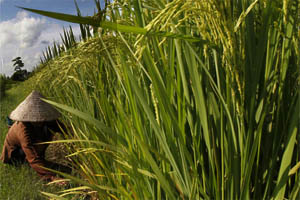News Desk : dhakamirror.com

According to the Global Food Policy Report-2022, 14.8 million people would be at danger of becoming hungry by 2030 as a result of climate change. The analysis, created by the International Food Policy Research Institute (IFPRI) says, 11.3 million people would go hungry in 2030 if climate change had no effect.
Over 750 million people in South Asia are reportedly affected by floods, droughts, and other climatic hazards brought on by climate change, according to a report that was released on Wednesday for Bangladesh at a hotel in Dhaka.
Climate change is predicted to cause a drop in overall calorie consumption in Bangladesh of up to 17% by 2030. The research stated that the region has seen production losses and decreased crop yields as a result of the unprecedented suite of climate changes.
According to the study, up to 60% of the animal protein consumed by people in India and Bangladesh comes from subsistence fisheries, but increased salinity intrusions in inland aquaculture ponds have led to fish mortality.
While temperatures rose on average by 0.7 degrees Celsius between 1901 and 2018, a greater increase was seen across the Himalayas, according to the report (1.3 degrees Celsius). According to the paper, Bangladesh has experienced an increase in average annual temperatures over the past six decades, with warming intensifying from 2001 onward. From 1981 to 2010, there was also a drop in precipitation of roughly 84 millimeters per decade.
Extreme precipitation events will be 1.7 times more likely in Bangladesh by 2050 than they are now, read the report presented by Aditi Mukherji, principal researcher at the International Water Management Institute. The 2017 Bangladesh flood is described in the study as “one exceptional case.” In 2017, flash floods in Bangladesh destroyed 220,000 hectares of boro paddy that was almost ready for harvest. Paddy prices increased by 30% year on year as a result of the floods.
Under low- and high-emission scenarios, a different study estimates that Bangladesh will have lost between $18 and 20 million by 2050 in ecosystem services as a result of climate change. The IFPRI research claims that urea use, a significant nitrous oxide emitter, is substantially subsidized throughout South Asia, particularly in irrigated areas, leading to its widespread overuse. This conclusion is based on the analysis of many studies.
Shahidur Rashid, director (South Asia) of IFPRI, said during the event that the region would find it extremely difficult to meet the SDG target of ending hunger by 2030 due to the impact of climate change. The worldwide emissions from the agriculture and food industries will provide a significant challenge over the next 30 years, according to Channing Arndt, director of IFPRl’s Environment and Production Technology Division. Countries must address this issue.
Tenzin Lekphell, secretary general of the Bay of Bengal Initiative for Multi-Sectoral Technical and Economic Cooperation (BIMSTEC), stated that “Climate change is not confined to national boundaries and our member countries must consider trans-boundary action on mitigation and adaptation to address the impact of climate change”.
Planning Minister MA Mannan said the government was committed to promote sustainable agriculture.
He stated, “We are working to enhance early warning systems, invest in climate smart technologies and develop crop varieties that can withstand heat and salinity.




















